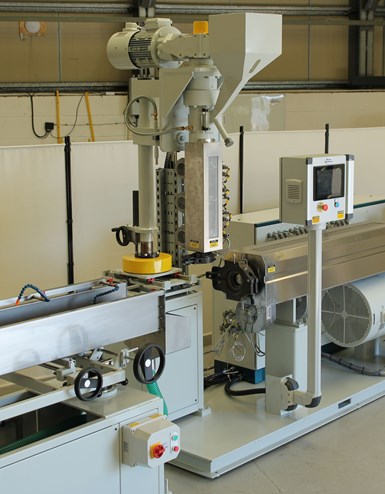Space Saving, Fully Adjustable Vertical Coextruder
Machine and primary extruder sit on a common base to reduce footprint and free up the manufacturing floor.
Boston Matthews has introduced a space-saving vertical jockey (coextruder) and main extruder production set-up. The extruders are situated on a common base, reducing the usual footprint to a minimum while saving production space.
The unit shown comprises of a 3-in. (75-mm) main single-screw extruder with a 1-in. (30-mm) coextruder. Boston Matthews offers a range of extruder sizes/outputs to meet the customer’s specific requirements. This also includes options for the processing of fluorocarbons and high-temperature polymers such as PEEK.
The vertical machine can be moved up and down, forward and back, and can be swiveled a complete 270°. This reduces alignment procedures to fine adjustments. The precision fine adjustment will help to simplify and reduce set-up time, while minimizing the risk of damage to the tooling during the process.

Photo: Boston Matthews
Both extruders are controlled by one central control system using the Boston Matthews Smart Control System. This is a color touch-screen PLC that provides total control, recipe storage, alarms, trending, network connectivity, management set security levels, production data export and production monitoring safety controls.
AC, direct-drive technology provides precision screw speed holding for the highest quality melt and output performance whilst at the same time ensuring maximum energy efficiency is obtained. Direct-Drive also is said to greatly reduces operational noise, dust and routine maintenance.
Related Content
-
Roll Cooling: Understand the Three Heat-Transfer Processes
Designing cooling rolls is complex, tedious and requires a lot of inputs. Getting it wrong may have a dramatic impact on productivity.
-
How Polymer Melts in Single-Screw Extruders
Understanding how polymer melts in a single-screw extruder could help you optimize your screw design to eliminate defect-causing solid polymer fragments.
-
Why Are There No 'Universal' Screws for All Polymers?
There’s a simple answer: Because all plastics are not the same.














